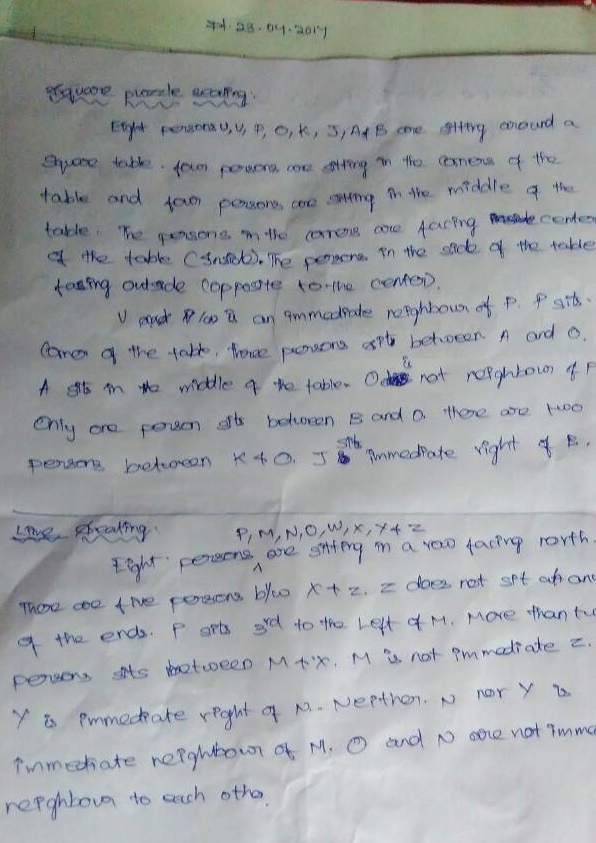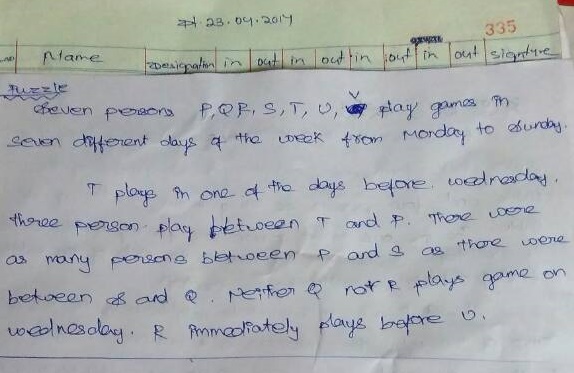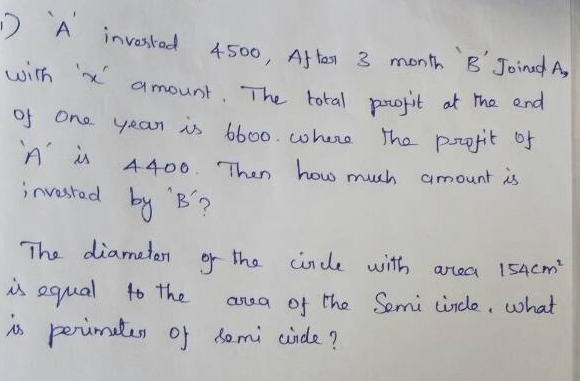Questions asked in NIACL Assistant Prelims : All Slots
Want to Become a Bank, Central / State Govt Officer in 2020?
Join the Most awarded Coaching Institute & Get your Dream Job


Now Prepare for Bank, SSC Exams from Home. Join Online Coure @ lowest fee
Lifetime validity Bank Exam Coaching | Bank PO / Clerk Coaching | Bank SO Exam Coaching | All-in-One SSC Exam Coaching | RRB Railway Exam Coaching | TNPSC Exam Coaching | KPSC Exam Coaching
Questions asked in NIACL Assistant Prelims : All Slots
Comprehension Questions 4th Slot (Courtesy: Mr. Chozhan)
Ramabai Ranade was one of the great social reformers of her time and (1)staunch supporter of woman’s’ rights. She was born on 25th January, 1863.
She was married to Mahadev Govind Ranade at the young girl of eleven. She was twenty one years junior to her husband. But the (2)disparity in age did not come in the way of young Ramabai to understand her husband. In no time she blossomed into the most (3)suitable partner for him.
She had the curiosity to learn and had a great (4)thirst for knowledge. Mahadev Govind Ranade taught her to read and write Marathi and English for two hours every day.
When Ramabai, with the active cooperation and help of few ladies worked to start a High School for girls, she was (5)confronted by endless opposition from the people. But, her husband gave all his support and after a struggle the institution came into existence.
The facility to set up an individual establishment at Nasik in 1875 helped Ranade to concentrate more in their mission of life. Ramabai, now an efficient house-wife, relieved Ranade of all the responsibilities of (6)running a home.
Ramabai founded the ‘Seva Sadan Society’ in Poona. Soon, it had many branches in Bombay (now Mumbai). The Sadan aimed at preparing good housewives and citizen, help the down-trodden and prepare them to lead a (7)useful life. Ramabai extended a wing for nursing and medicine. Many upper-class widows and girls started taking lessons here. Many an unfortunate destitute was (8)rehabilitated through this institution.
Ramabai took active part in the suffrage movement. She was ever ready to help the needy and stranded women. Any call for help and she was there with her band of workers. She lost her husband in 1901. But she was not disheartened. After a year she began her work again to continue till she breathed her last. Twenty-seven years of experience under the guidance of her husband was of great help to her.
Ramabai Ranade was a good writer in he own right. Her reminiscences and the autobiography are a brilliant record of the social conditions of her time. She passed away in 1924.
Puzzle Test Questions 3rd Slot (Courtesy: Mr. Chozhan)


Number Series Questions ( Courtesy : Mr. Dinesh)

Answers:
- 925
- 74
- 18
- 114
- 183
Application questions in Quants asked in NIACL Assistant Prelims (Courtesy : Suganya)

Mixture and Alligation
50 litres of milk and water in the ratio of 2:3. How much water we need to add to get the ratio of 5:9?
Number Series
1) 7, 10, 15, 24, 39, ?
2) 6, 11, 21, 38, 64, ?
3) 17, 36, 74, 131, ?, 132
4) 8, 4, 4, 6, x, 30
5) 3, 4, 10, 33, 136, ?
Answers: Courtesy (Mr.Dinesh)

Puzzle Test (Courtesy : Ms. Kanimozhi)
8 frnds sits in a straight line.. A,B,C,D,L,M,N,O.. Two members sit between A and D.. D sits in one of the corner.. O sits second to the left of L.. number of people sits between A and L is same as between A and B… Two members sits between B and M.. c is immediate neighbour of neither c nor D
Reading Comprehension (Courtesy : Mr. Dinesh)
Well, he set out, and he traveled a long way, and at last he came to a woman’s cottage that had some grass growing on the roof. And the woman was trying to get her cow to go up a ladder to the grass, and the poor thing durst not go. So the gentleman asked the woman what she was doing. “Why, lookye,” she said, “look at all that beautiful grass. I’m going to get the cow on to the roof to eat it. She’ll be quite safe, for I shall tie a string round her neck, and pass it down the chimney, and tie it to my wrist as I go about the house, so she can’t fall off without my knowing it.” “Oh, you poor silly!” said the gentleman, “you should cut the grass and throw it down to the cow!” But the woman thought it was easier to get the cow up the ladder than to get the grass down, so she pushed her and coaxed her and got her up, and tied a string round her neck, and passed it down the chimney, and fastened it to her own wrist. And the gentleman went on his way, but he hadn’t gone far when the cow tumbled off the roof, and hung by the string tied round her neck, and it strangled her. And the weight of the cow tied to her wrist pulled the woman up the chimney, and she stuck fast half-way and was smothered in the soot.
And the gentleman went on and on, and he went to an inn to stop the night, and they were so full at the inn that they had to put him in a double-bedded room, and another traveler was to sleep in the other bed. The other man was a very pleasant fellow, and they got very friendly together; but in the morning, when they were both getting up, the gentleman was surprised to see the other hang his trousers on the knobs of the chest of drawers and run across the room and try to jump into them, and he tried over and over again, and couldn’t manage it; and the gentleman wondered whatever he was doing it for. At last he stopped and wiped his face with his handkerchief. “Oh dear,” he says, “I do think trousers are the most awkwardest kind of clothes that ever were. I can’t think who could have invented such things. It takes me the best part of an hour to get into mine every morning, and I get so hot! How do you manage yours?” So the gentleman burst out a-laughing, and showed him how to put them on; and he was very much obliged to him, and said he never should have thought of doing it that way.
Then the gentleman went on his travels again; and he came to a village, and outside the village there was a pond, and round the pond was a crowd of people. And they had got rakes, and brooms, and pitchforks, reaching into the pond; and the gentleman asked what was the matter. “Why,” they say, “matter enough! Moon’s tumbled into the pond, and we can’t rake her out anyhow!” So the gentleman burst out a- laughing, and told them to look up into the sky, and that it was only the shadow in the water. But they wouldn’t listen to him, and abused him shamefully, and he got away as quick as he could.
So there was a whole lot of sillies bigger than them three sillies at home. So the gentleman turned back home again and married the farmer’s daughter, and if they didn’t






1 comment
The last puzzle test question by MS. Kanimozhi is wrong. So please check the question and do the needful. I am very eager for your response.